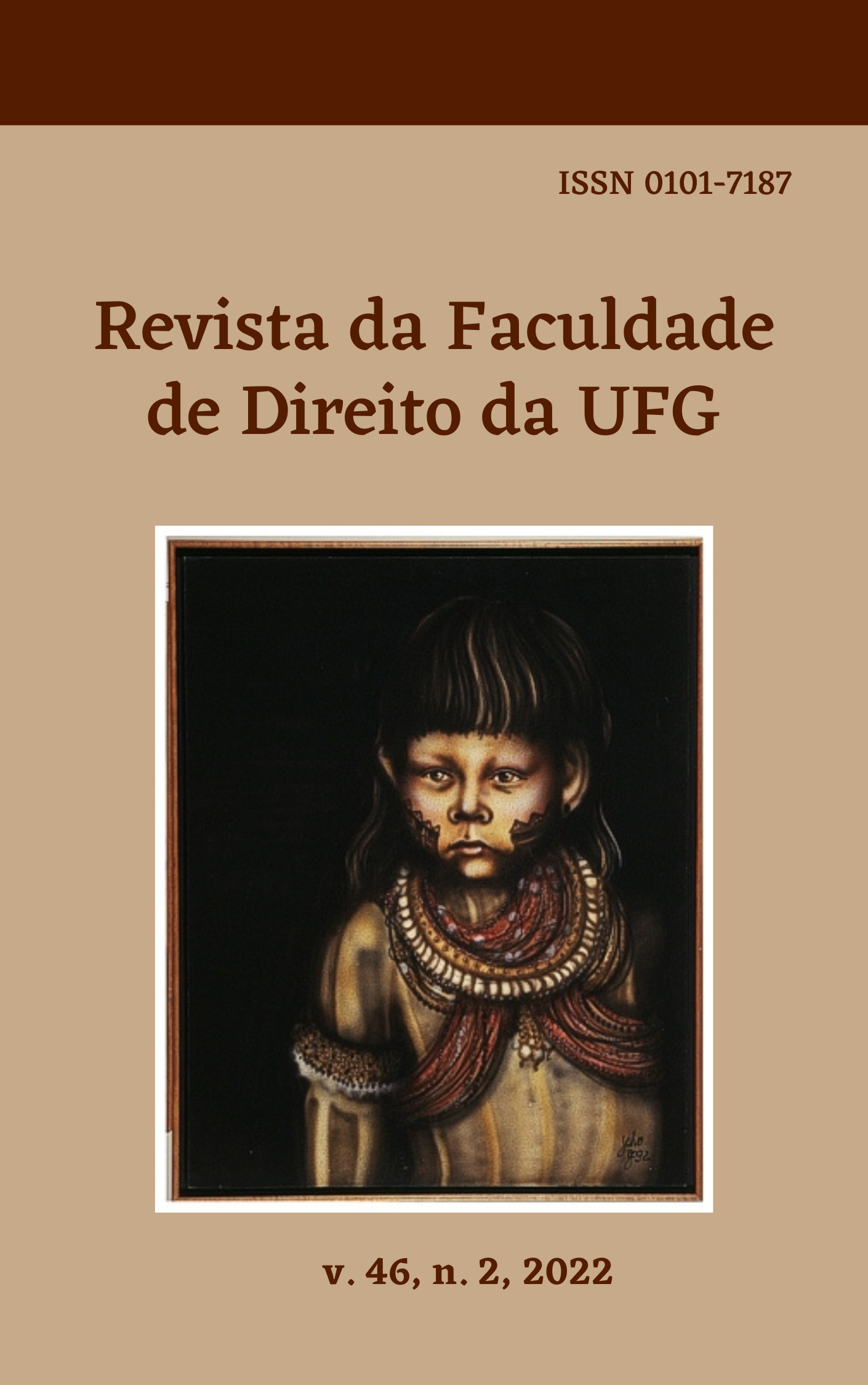Juicio político, ideología y utopía
elementos para la construcción de un imaginario jurídico
Palabras clave:
Juicio Político, Ideología, Utopía, ImaginarioResumen
Este artículo presenta una concepción específica del imaginario, un imaginario jurídico, a través de los conceptos de juicio político e ideología desarrollados en las filosofías de Hannah Arendt y Paul Ricoeur. A continuación, el artículo procede a aclarar la noción de juicio político en la obra de Arendt y cómo la ideología y la utopía se relacionan en sí mismas en las reflexiones de Ricoeur sobre los justos. La investigación adoptó la revisión de la literatura centrada en esos tres conceptos dentro de los trabajos de Arendt y Ricoeur como su metodología con el fin de desarrollar una concepción del imaginario jurídico que se afianza en la práctica jurídica ordinaria, pero que también tiene una potencial normatividad radical que trasciende los valores y referencias. que ya forman parte del ámbito legal. El artículo concluye que este concepto de imaginario jurídico se relaciona con una proyección colectiva de las relaciones sociales y estructuras políticas consideradas más deseables, que lo caracteriza como concepto político esencial impugnable: cada grupo proyecta sobre este imaginario sus valores, convicciones y deseos, interpretando y operacionalizar las normas legales a través de tales referencias particulares.
Descargas
Citas
ARENDT, Hannah. The Life of Mind: The Groundbreaking Investigation on How We Think. New York: Harvest Book, 1971.
ARENDT, Hannah. Notas sobre a política e o Estado em Maquiavel. Lua Nova, v. 55–56, p. 298–302, 2002.
ARENDT, Hannah. Understanding and Politics (The Difficulties of Understanding). In: ARENDT, Hannah. Essays in Understanding, 1930-1954: Formation, Exile, and Totalitarianism. New York: Schocken Books, 2005. p. 307–327.
AUSTIN, J. L. How to do Things with Words. 2. ed. Harvard: Harvard University Press, 1975.
BERNSTEIN, Richard J. Arendt on Thinking. In: VILLA, Dana (Org.). The Cambridge Companion to Hannah Arendt. London: Cambridge University Press, 2001. p. 277–292.
CASTORIADIS, Cornelius. The Imaginary Institution of Society. Cambridge, UK: Polity Press, 1997.
CASTORIADIS, Cornelius. The Social Imaginary: A Critical Assessment of Castoriadis´s Psychoanalytic Social Theory. American Imago, v. 59, n. 2, p. 141–170, 2002.
CASTORIADIS, Cornelius. The Imaginary as Such. Social Imaginaries, v. 1, n. 1, p. 59–69, 2015.
CORNELL, Drucilla. The Imaginary Domain: Abortion, Pornography and Sexual Harrassment. London: Routledge, 1995.
CORNELL, Drucilla. At the Heart of Freedom: Feminism, Sex, and Equality. Princeton, New Jersey: Princeton University Press, 1998.
D´ENTREVÈS, Maurizio Passerin. Arendt’s Theory of Judgment. In: VILLA, Dana (Org.). The Cambridge Companion to Hannah Arendt. London: Cambridge University Press, 2001. p. 245–260.
DOLAN, Frederick M. Arendt on Philosophy and Politics. In: VILLA, Dana (Org.). The Cambridge Companion to Hannah Arendt. London: Cambridge University Press, 2001. p. 261–276.
EDLIN, Douglas E. Kant and the Common Law: Intersubjectivity in Aesthetic and Legal Judgment. Canadian Journal of Law and Jurisprudence, v. 23, n. 2, p. 429–460, 2010.
GUYER, Paul. Reason and Reflective Judgment: Kant on the Significance of Systematicity. Noûs, v. 24, n. 1, p. 17–43, 1990.
JACKSON, Emily. Imagining the Future: Drucilla Cornell’ s Transformations and Catharine MacKinnon’s Only Words. Law and Critique, v. 5, n. 2, p. 165–174, 1994.
LEFEBVRE, Alexandre. The Image of Law: Deleuze, Bergson, Spinoza. Stanford: Stanford University Press, 2008.
LEVI, Albert William. The Two Imaginations. Philosophy and Phenomenological Research, v. 25, n. 2, p. 188–200, 1964.
MAKKREEL, Rudolf A. Regulative and Reflective Uses of Purposiveness in Kant. The Southern Journal of Philosophy, v. 30, p. 49–63, 1991.
NASCIMENTO, Paulo César; FERNANDES, Mateus Braga. A phrônesis, o herói e a pólis: os paradoxos de Hannah Arendt como leitora dos antigos. Revista Brasileira de Ciência Política, v. 16, p. 273–292, 2015.
PIOMBO, Horacio J. J. El pragmatismo judicial de Oliver Wendell Holmes, Jr. y la teoría predictiva del Derecho. Doxa. Cuadernos de Filosofía del Derecho, v. 43, p. 189–218, 2020.
PIPPIN, Robert B. The Significance of Taste: Kant, Aesthetic and Reflective Judgment. Journal of the History of Philosophy, v. 34, n. 4, p. 549–569, 1996.
RICOEUR, Paul. Lectures on Ideology and Utopia. New York: Columbia University Press, 1986.
RICOEUR, Paul. Aesthetic Judgment and Political Judgment According to Hannah Arendt. In: RICOEUR, Paul. The Just. Chicago: Chicago University Press, 2000a. p. 94–109.
RICOEUR, Paul. Who is the Subject of Rights? In: RICOEUR, Paul. The Just. Chicago: Chicago University Press, 2000b. p. 1–10.
RICOEUR, Paul. The Act of Judging. In: RICOEUR, Paul. The Just. Chicago: Chicago University Press, 2000c. p. 127–132.
RICOEUR, Paul. The Concept of Responsibility: An Essay in Semantic Analysis. In: RICOEUR, Paul. The Just. Chicago: Chicago University Press, 2000d. p. 11–35.
SCHWARTZ, Jonathan Peter. Hannah Arendt´s Theory of Political Judgment. Thesis—Durham, NC: Duke University, 2014.
ZENKIN, Sergey. Social Action and its Sense: Historical Hermeneutics after Ricoeur. Ricoeur Studies, v. 3, n. 1, p. 86–101, 2012.
Descargas
Publicado
Cómo citar
Número
Sección
Licencia
Os Autores que publicam nesta revista concedem à Revista da Faculdade de Direito da UFG uma licença mundial, sem royalties, sujeita aos termos e condições da Licença Jurídica Creative Commons Atribuição 3.0 Brasil Creative Commons Attribution License
Os autores concedem à RFD UFG todos os direitos autorais sobre os artigos nela publicados, que os mantêm com exclusividade até o advento de domínio público sobre os mesmos.
























